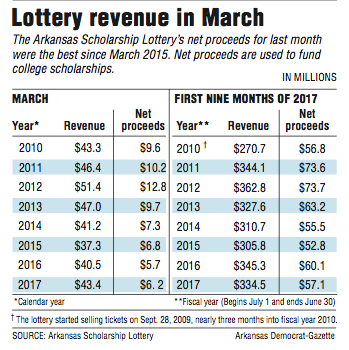The Arkansas Scholarship Lottery's revenue and net proceeds in March increased compared with the same month a year ago.
The day before the month ended, a lottery retailer in Stuttgart sold the winning ticket for the $177 million Mega Millions jackpot.
Total revenue increased from $40.5 million in March of last year to $43.4 million last month, the lottery reported this week in its monthly report to Gov. Asa Hutchinson and the Legislature's lottery oversight subcommittee.
Net proceeds, which pay for college scholarships, increased from $5.7 million in March 2016 to $6.2 million last month, the lottery reported.
The year-to-year increase in net proceeds largely was based on growth in scratch-off ticket sales, a smaller increase in draw-game ticket sales and a reduction in expenses, lottery Director Bishop Woosley said.
The lottery started selling tickets on Sept. 28, 2009, and has helped finance more than 30,000 Arkansas Academic Challenge Scholarships during each of the past seven fiscal years.
The lottery's revenue and net proceeds for college scholarships peaked at $473.6 million and $97.5 million, respectively, in fiscal 2012 before falling for three consecutive fiscal years. With the help of a world-record Powerball run in January 2016, revenues and net proceeds rebounded in fiscal 2016 to $456.3 million and $85.3 million, respectively.
Even with that fiscal 2016 rebound, lawmakers have been reluctant to raise the amounts for future scholarships because they said they wanted to make sure the increased proceeds are sustainable.
Legislators this year passed a law to create the Arkansas Workforce Challenge Scholarship program that will be financed with future surplus lottery proceeds. The program will provide scholarships up to $800 each for students seeking an associate degree or certificate in high-demand fields.
Scratch-off ticket revenues increased from $34.7 million in March 2016 to $36.8 million last month, while draw-game ticket revenues increased from $5.8 million to $6.4 million in the same period, the lottery reported. Revenues include fees paid by retailers.
"We had an excellent month of sales for instant tickets," Woosley said Tuesday. "In addition, we were up in almost all of our draw games for the month versus last year."
Powerball ticket revenues increased from $2.1 million in March 2016 to $4.4 million last month, while Mega Millions ticket revenues increased from $1 million in March 2016 to $1.2 million last month.
During the first nine months of fiscal 2017, revenues totaled $334.5 million -- down from $345.3 million during the same period in fiscal 2016 -- according to the lottery.
So far in fiscal 2017, scratch-off ticket revenues are $272.1 million -- up from $270.1 million in the same period in fiscal 2016 -- and draw-game ticket revenues are $61.7 million -- down from $74.5 million in the same period a year ago.
During the first nine months of fiscal 2017, net proceeds for college scholarships have reached $57.1 million -- down from $60.1 million in the same period in fiscal 2016 -- the lottery's reports show.
Under state law, the lottery's unclaimed prize reserve fund, minus $1 million, is transferred into scholarships at the end of each fiscal year. The reserve fund balance totaled $6.4 million on March 31.
Woosley has projected revenues at $463.4 million and net proceeds at $80.9 million in fiscal 2017, which ends June 30.
"We are currently over budget in proceeds by two million dollars for the year. I am hopeful that will hold up," he said.
This year's Legislature approved Senate Bill 258 -- which is now Act 613 of 2017 -- sponsored by Sen. Jimmy Hickey, R-Texarkana, to create the Arkansas Workforce Challenge Scholarship program. The program will use any excess lottery proceeds to fund scholarships for students enrolled in higher education programs leading to the students being qualified to work in high-demand occupations.
To be eligible for the scholarship, applicants are required to have graduated from a public or private high school or home school in any state, or have received a high school equivalency diploma. The student must not have an Arkansas Academic Challenge Scholarship. They must be Arkansas residents if they are at least 21. If younger than 21, either they or their parent must be an Arkansas resident.
They also would have to be accepted for admission in a program of study at a state or private higher education institution in Arkansas leading to an associate degree or a certificate program in industry, health, information technology and a program resulting in the student being qualified to work in an occupation identified by the Department of Workforce Services under Act 613.
Any lottery proceeds beyond the amount needed to fund the base Academic Challenge Scholarships would flow into a trust account for a year. If the Department of Higher Education doesn't use the money for those base scholarships, up to $800 would be distributed to students qualifying for Workforce Challenge Scholarships, Hickey said. Academic Challenge Scholarships now are funded with the lottery's net proceeds plus $20 million a year in state general revenue. There is also a $20 million lottery reserve account that is temporarily tapped to cover cash shortfalls to cover scholarships and later replenished with net proceeds.
Hickey estimated it will take about $100 million in net proceeds and general revenue to fund Academic Challenge Scholarships before any excess net proceeds are available for Workforce Challenge Scholarships.
Metro on 04/12/2017

